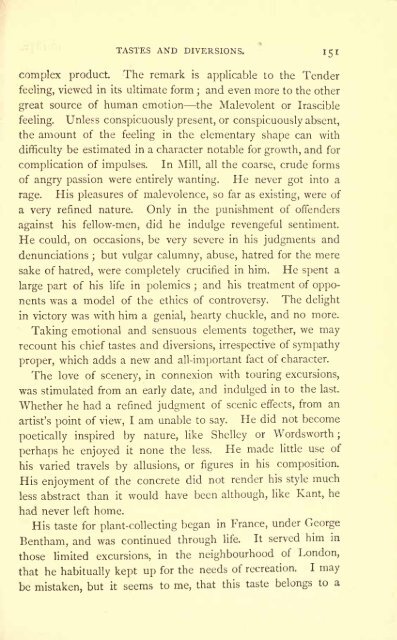John Stuart Mill: A Criticism with Personal Recollections
John Stuart Mill: A Criticism with Personal Recollections
John Stuart Mill: A Criticism with Personal Recollections
Create successful ePaper yourself
Turn your PDF publications into a flip-book with our unique Google optimized e-Paper software.
TASTES AND DIVERSIONS. 151<br />
complex product. The remark is applicable to the Tender<br />
feeling, viewed in its ultimate form ; and even more to the other<br />
great<br />
feeling.<br />
source of human emotion the Malevolent or Irascible<br />
Unless conspicuously present, or conspicuously absent,<br />
the amount of the feeling in the elementary shape can <strong>with</strong><br />
difficulty be estimated in a character notable for growth, and for<br />
complication of impulses. In <strong>Mill</strong>, all the coarse, crude forms<br />
of angry passion were entirely wanting. He never got into a<br />
rage. His pleasures of malevolence, so far as existing, were of<br />
a very refined nature. Only in the punishment of offenders<br />
against his fellow-men, did he indulge revengeful sentiment.<br />
He could, on occasions, be very severe in his judgments and<br />
denunciations ;<br />
but vulgar calumny, abuse, hatred for the mere<br />
sake of hatred, were completely crucified in him. He spent a<br />
large part of his life in polemics ; and his treatment of oppo<br />
nents was a model of the ethics of controversy. The delight<br />
in victory was <strong>with</strong> him a genial, hearty chuckle, and no more.<br />
Taking emotional and sensuous elements together, we may<br />
recount his chief tastes and diversions, irrespective of sympathy<br />
proper, which adds a new and all-important fact of character.<br />
The love of scenery, in connexion <strong>with</strong> touring excursions,<br />
was stimulated from an early date, and indulged in to the last.<br />
Whether he had a refined judgment of scenic effects, from an<br />
artist s point of view, I am unable to say. He did not become<br />
poetically inspired by nature, like Shelley or Wordsworth;<br />
perhaps he enjoyed<br />
it none the less. He made little use of<br />
his varied travels by allusions, or figures in his composition.<br />
His enjoyment of the concrete did not render his style much<br />
less abstract than it would have been although, like Kant, he<br />
had never left home.<br />
His taste for plant-collecting began in France, under George<br />
Bentham, and was continued through<br />
those limited excursions, in the neighbourhood<br />
of London,<br />
that he habitually kept up for the needs of recreation. I may<br />
to a<br />
life. It served him in<br />
be mistaken, but it seems to me, that this taste belongs

















